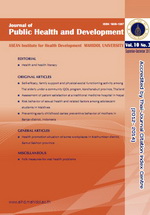Effectiveness of self-efficacy in oral health care based on Muslim’s faith among junior high school students, Narathiwat province
Main Article Content
Abstract
The aim of the present study was to evaluate the effectiveness of promoted self-efficacy in oral hygiene care in relation to knowledge, perception, expectation and belief in self-efficacy and oral health behaviors on amount plaque and caries prevalence among junior high school students. A quasi-experimental study was carried out in all 3-public schools of Bacho district, Narathiwat province, Thailand. Schools were randomly allocated to experimental and control groups. All students in the school were recruited as sample that is 97 students from one school for an experimental group, whereas 118 students from the other two schools for control group. 4 consecutive oral self-care promotion sessions were delivered for experimental group in every two-week. Students in a control group received regular school dental health education. Data were collected before and after intervention of the oral health promotion program at baseline, 6-month and 1-year, using a questionnaire, observing tooth brushing, recording plaque score and dental caries prevalence. Paired t- test was used to compare results within each group while the independent t-test was used to compare results between groups. Wilcoxon singed ranks test and Mann-Whitney Utest were used for non-normal distributed data. The results show that students in an experimental group had significantly higher knowledge, perception, expectation and belief in self-efficacy, and had better tooth brushing habit than that of a control group. The experimental group also had lesser plaque and had lower caries prevalence (p<0.05). Self-efficacy promotion towards oral hygiene care facilitated students to have better knowledge, self-efficacy, oral health behaviors and oral health status. Longitudinal study should be carried out to monitor the sustainability of oral health behaviors.
Article Details
How to Cite
1.
Waeyusoh N, Thitasomakul S, Pithpornchaiyakul W. Effectiveness of self-efficacy in oral health care based on Muslim’s faith among junior high school students, Narathiwat province. J Public Hlth Dev [internet]. 2014 Apr. 28 [cited 2026 Feb. 28];12(1):53-74. available from: https://he01.tci-thaijo.org/index.php/AIHD-MU/article/view/17743
Section
Original Articles


